May 26, 2025 | 14:27 GMT +7
May 26, 2025 | 14:27 GMT +7
Hotline: 0913.378.918
May 26, 2025 | 14:27 GMT +7
Hotline: 0913.378.918
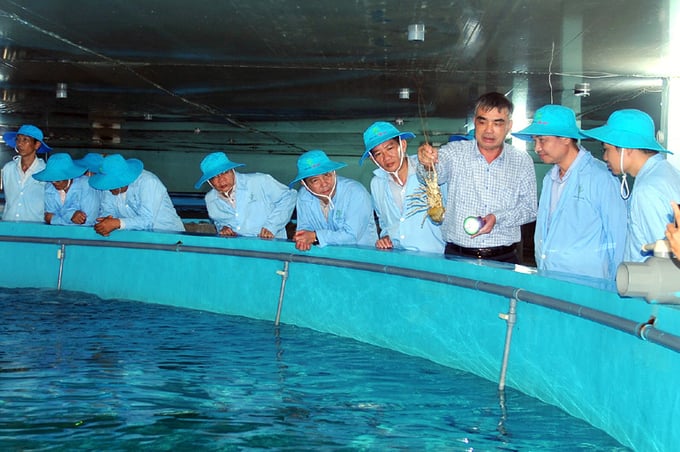
The Research Institute for Aquaculture 3 has provided consultation and transferred technology to Dac Loc Seafood Co., Ltd. for lobster farming in a recirculating aquaculture system (RAS) using industrial feed. Photo: Ngoc Chung.
According to Dr. Mai Duy Minh from the Research Institute for Aquaculture 3 (RIA3), in addition to improving artificial broodstock production technologies, the Institute has researched and transferred breakthrough farming processes that saw widespread application in local production practices.
For example, the National Marine Breeding Center for the Central Region, which operates under the Institute, successfully developed a commercial farming process for white-leg shrimp. Accordingly, the process promoted a transition from earthen ponds to lined ponds, supported by the recirculating aquaculture system (RAS) technology. This is an advanced aquaculture technology that conserves water and reduces environmental impact.
The practice of farming white-leg shrimp in ponds has expanded considerably in the Central Region and numerous provinces nationwide, marking a significant milestone in the development of white-leg shrimp farming in Vietnam. At present, the Institute has successfully adopted the RAS technology, which produces yields of over 30 kilograms per cubic meter. Consequently, the technology has resulted in high economic efficiency and minimized risks for local farmers.
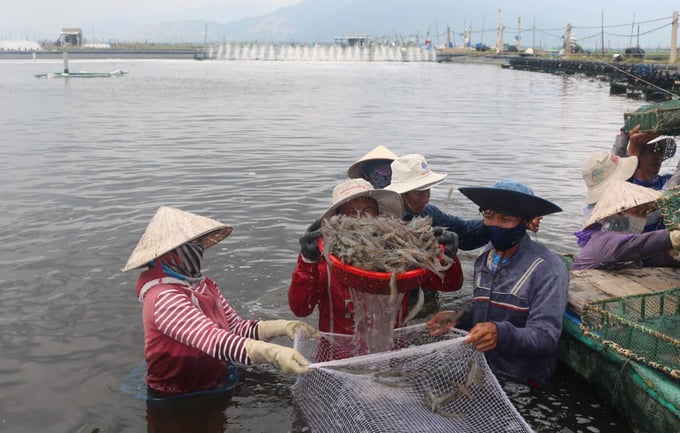
White-leg shrimp farming has gained increased popularity across the country. Photo: KS.
In addition, the spotted babylon snail, a high-value marine delicacy, was previously a rare commodity, harvested in limited quantities from the wild. However, the Institute's development of a comprehensive farming technique has helped deliver this distinct flavor to a wider range of consumers. Accordingly, the farming process encompasses broodstock production, commercial farming in net cages, earthen ponds, cement tanks, and recirculating aquaculture system (RAS) models, which have significantly boosted productivity to 10 to 12 kilograms per square meter.
"We have developed a recirculating aquaculture system that reuses water and utilizes industrial feed to support spotted babylon snail farming. Farmers are welcoming to the use of industrial feed as it helps to reduce environmental pollution, labor costs, and increase economic efficiency. Furthermore, scientists at the Institute have also invented a multifunctional machine that aids in pond cleaning, snail harvesting, and thinning, which greatly improves farming operations," reported Dr. Mai Duy Minh.
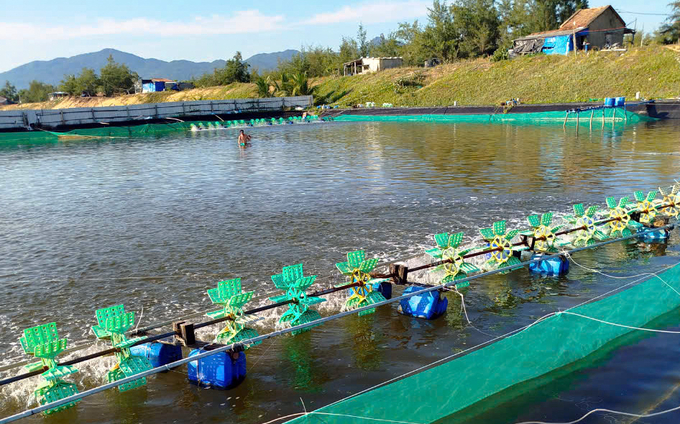
The spotted babylon snail farming model has yielded high economic returns for local farmers. Photo: KS.
The Ministry of Agriculture and Rural Development has officially recognized the Institute's commercial farming processes for barramundi (Lates calcarifer, Bloch, 1790) in cages using industrial feed and for peanut worms (Sipunculus nudus) in earthen ponds as technical advancements. The Institute has also transferred farming techniques for pearl grouper and single oysters to producers in Khanh Hoa Province and various other regions.
The breeding processes for several sturgeon species, as well as commercial farming of rainbow trout and sturgeon in flow-through tanks and cages in reservoirs, have stimulated the development of cold-water fish farming in the Central and Central Highlands regions. This farming model accounts for approximately 70% of the country's cold-water fish production, contributing significantly to the socio-economic development of the aforementioned regions. These breakthroughs are the results of research programs assigned to the Institute by the Ministry of Agriculture and Rural Development and the provinces of Khanh Hoa and Lam Dong since 2012.
With demonstration models, agricultural extension training, instructional materials, and media broadcasts, the Institute has transferred, expanded, and applied these technical advancements in practical production settings.
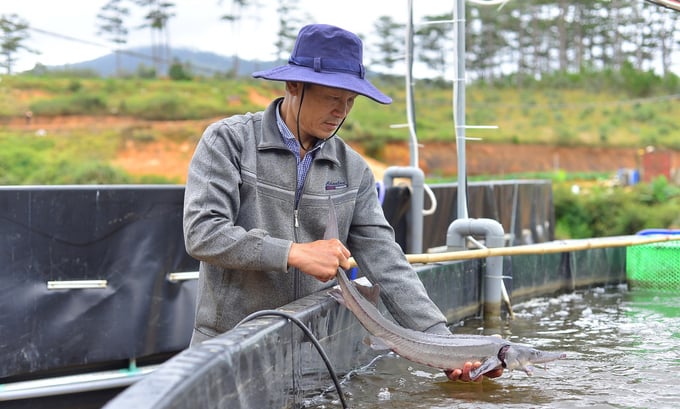
Cold-water fish farming in flow-through tanks and cages in reservoirs is rapidly developing in Lam Dong Province. Photo: KS.
Over the years, the Institute has researched, applied, and transferred commercial eel farming models across different regions nationwide. In addition to the RAS models adopted by various businesses in the Central and Northern regions, the Institute has also implemented extensive farming models in ponds, creating livelihoods for farmers in the Northern mountainous regions, the Central Highlands, and the Mekong Delta.
Furthermore, the Institute has researched and utilized industrial feed in eel farming, which has mitigated adverse environmental impacts compared to using live feed during the nursery and commercial phases.
With the goal of promoting a green, circular, and sustainable economy, the Institute has developed and expanded integrated farming models featuring various species within the same system.
A notable example from this research group includes the integrated multi-species farming study, which received the Vifotec Award from the Ministry of Science and Technology. Subsequently, the Institute conducted research on integrating sea cucumbers with spotted babylon snails in ponds using industrial feed. Notably, the Institute has transferred and expanded the research results in Central Vietnam as well as other countries, including the Philippines and Sri Lanka.
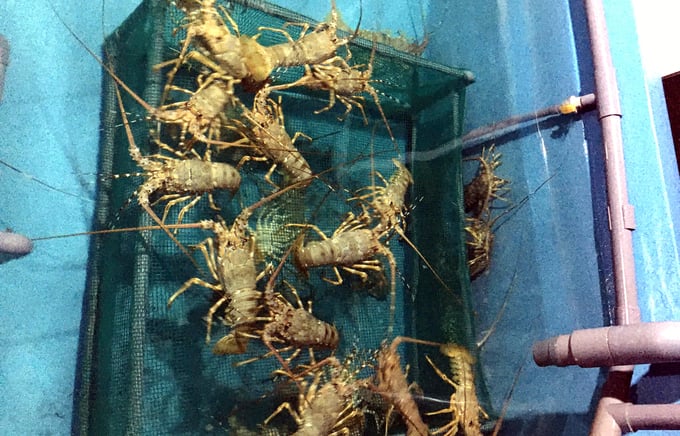
Lobster farming in a recirculating aquaculture system using industrial feed. Photo: KS.
According to Dr. Mai Duy Minh, integrating sea cucumbers with spotted babylon snails helps maintain a loose and clean substrate environment in the ponds, thereby facilitating the rapid growth of spotted babylon snails. Moreover, the snails boast a high survival rate with increased product value per unit area. This model has received commendations from international peers and local aquaculture practitioners.
Lobsters are also a traditional aquaculture species in the Central region. The Institute has researched and developed several technology processes recognized by the Ministry of Agriculture and Rural Development, including: the nursing process for lobster (Panulirus ornatus) broodstock in cages; the process for controlling Vibrio alginolyticus, which causes red body disease in lobsters (Panulirus spp.) raised in cages; the process for controlling Rickettsia-like bacteria (RLB), which causes white spot disease in lobsters (Panulirus spp.) raised in cages; technical solutions for treating white spot disease and red body disease in lobsters; and the process for land-based lobster farming in a recirculating aquaculture system (RAS) combined with industrial feed usage.
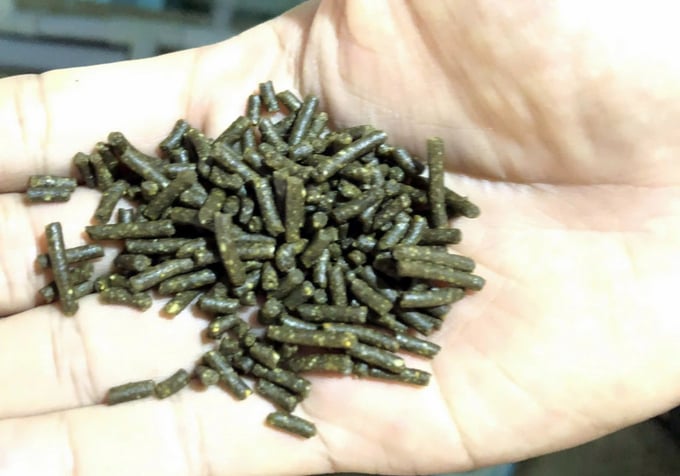
The Research Institute for Aquaculture 3 has developed industrial feed for spotted babylon snails and lobsters. Photo: KS.
Additionally, many other technological processes developed by the Institute have received official recognition by the Ministry of Agriculture and Rural Development. These processes have also seen widespread application by businesses and aquaculture practitioners in production. This success affirms the Institute's significant contributions to the development of aquaculture in Vietnam. Examples include the process for controlling Vibrio spp., which causes acute hepatopancreatic necrosis disease (AHPND) in white-leg shrimp (Litopenaeus vannamei); the technology for commercial farming of sandfish (Holothura scabra) in ponds; and the breeding and farming process for the sandworm (Perinereis nuntia var. brevicirris).
"We have developed industrial feed suitable for ornamental and green lobsters. We have also transferred the technology for lobster farming in a recirculating aquaculture system (RAS) with industrial feed to several companies nationwide, such as Dac Loc Seafood Co., Ltd. (Phu Yen)," said Dr. Mai Duy Minh, adding that this model holds exceptional promise for the future and contributes to the sustainable development of lobster farming in Vietnam.
Translated by Nguyen Hai Long
/2025/05/25/4127-3-073637_820.jpg)
(VAN) Thanks to the promotion from an FAO-implemented project, vegetable production in greenhouses in Moc Chau has seen strong development, from 1.5 hectares in 2021 to nearly 50 hectares in 2024.

(VAN) FAO has recently supported USD 140,000 to implement the project 'Risk mitigation human-animal interface risks through disease control initiatives in pig farming.'

(VAN) The People's Committee of Tra Vinh province has approved an adjustment to the investment policy for the Green Hydrogen Plant project, increasing its area to approximately 52.76 hectares.
![Reducing emissions from rice fields: [2] Farmers’ commitment to the soil](https://t.ex-cdn.com/nongnghiepmoitruong.vn/608w/files/news/2025/05/05/dsc08881jpg-nongnghiep-140632.jpg)
(VAN) Clean rice cultivation model in Thuong Tan commune, Bac Tan Uyen district, is assisting local residents in achieving sustainable agriculture by substantially reducing costs, increasing productivity, and protecting the environment.

(VAN) At the conference to disseminate Resolution No. 68, AgriS introduced its digital agricultural ecosystem and reaffirmed its commitment to accompanying the Government in promoting private sector development and sustainable agriculture.

(VAN) 'Blue Ocean - Blue Foods' initiative is designed to restore marine ecosystems and establish sustainable livelihoods for local communities by cultivating a minimum of 1,000 hectares of cottonii seaweed in the first three years.
/2025/05/21/4642-3-112707_603.jpg)
(VAN) The V-SCOPE project has made direct contributions to three out of six pillars of the Comprehensive Strategic Partnership between Vietnam and Australia.